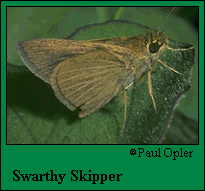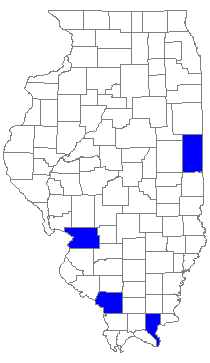 |
 

 |



Swarthy Skipper (Nastra lherminier [Latreille])
Wing span: 1 - 1 1/8 inches (2.5 - 2.9 cm).
Identification: Upperside is dark brown; forewing may have 2 very faint light spots. Underside of hindwing is yellow-brown with lighter veins.
Life history: Males perch near the ground on grass stems; most mating occurs in the late afternoon.
Flight: Two broods from May-September, earlier in the south.
Caterpillar hosts: Little bluestem (Andropogon scoparius).
Adult food: Nectar from low-growing flowers including selfheal, red clover, tick trefoil, purple vetch, New Jersey tea, and peppermint.
Habitat: Grassy, open areas such as sand barrens, meadows, hillsides, fields.
Range: Eastern United States from Missouri east to southern New York; south to eastern Texas, the Gulf states, and southern Florida. Strays north to northern Minnesota, southern Michigan, and western Kansas.
Conservation: Not usually required.
The Nature Conservancy Global Rank: G5 - Demonstrably secure globally, though it may be quite rare in parts of its range, especially at the periphery.
Management needs: None reported.
References:
Opler, P. A. and G. O. Krizek. 1984. Butterflies east of the Great Plains. Johns
Hopkins University Press, Baltimore. 294 pages, 54 color plates.
Opler, P. A. and V. Malikul. 1992. A field guide to eastern butterflies. Peterson
field guide #4. Houghton-Mifflin Co., Boston. 396 pages, 48 color plates.
Scott, J. A. 1986. The butterflies of North America. Stanford University Press,
Stanford, Calif. 583 pages, 64 color plates.
Stanford, R. E. and P. A. Opler. 1993. Atlas of western USA butterflies including
adjacent parts of Canada and Mexico. Denver and Fort Collins, CO.
Author: Jane M. Struttmann
State and Regional References:
Opler, P.A. 1998. A field guide to eastern butterflies, revised format.
Houghton Mifflin Co., Boston.
Sedman, Y. and Hess, D.F. 1985. The Butterflies of West Central Illionois.
Series in the Biological Sciences No. 11. Western Illinois Univ., Macomb,
IL. 118 pp.

